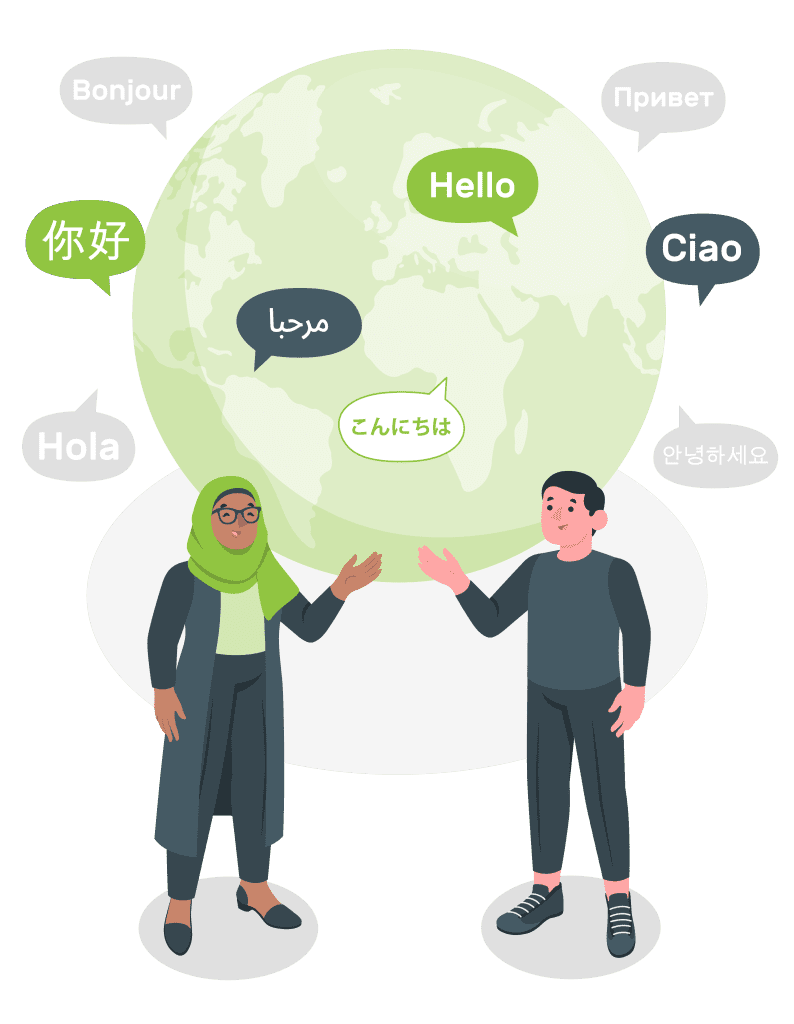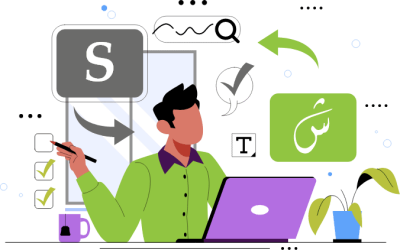Arabic Translation Services
100% human English to Arabic translation services delivered with best-in-class accuracy across 120+ languages, from the heart of the Middle East region.







English to Arabic Translation Services Powered By A Meticulously Selected Team of Native Arabic Translators
Based in the heart of MENA with 4 offices in the United Arab Emirates, Saudi Arabia, South Africa, and Egypt, bayantech brings Arabic translations in tune with the Arab world. With over two decades of experience and a remarkable track record of 80,000+ successfully delivered projects, we have become a leader in providing Arabic translation and localization solutions.
Native Arabic Translators

Only a native-speaking, culturally aware linguist is able to provide communications that are precise, relevant, and impactful.Our Arabic translation is always accurate, natural, and fluent because it is powered by professional human translators who are native Arabic speakers and based locally within the MENA region where they grew up speaking the language.
In-Country Linguists

Being immersed in Arab culture and communicating daily in their native tongue, they have a strong understanding of the intricacies of the language which helps us maintain the highest levels of linguistic accuracy and cultural relevance in every project we work on.
Arabic Translation Rates
We pair you with native Arabic translators specializing in your industry and fluent in your chosen dialect.
Get started today and see the difference precision and expertise can make!
bayantech End-To-End Arabic Translation Services
As a full-service translation provider, bayantech is professionally equipped to assist at every step, with experience delivering a wide range of services from and into Arabic including Arabic document translation services and Arabic desktop publishing. Whether you require a single service or an end-to-end solution, we ensure an optimal experience at every stage of your journey into the Arabic-speaking world.
- Arabic Document Translation
- Arabic Website Localization
- Arabic Multimedia Localization
- Arabic Desktop Publishing
- Arabic Voiceover
- Subtitling
- Transcription
- Machine Translation Post Editing
- Localization Testing
- Cultural Consultation
- Content Writing
- Arabic Translation Services
- eLearning Localization

Expand Your Business In The
Booming Arab Market
What Makes Bayantech Different

Professional Service
20+ Years of Experience
24/7 Availability

Qualified Translators
Native Arabic Translators
Experts in Every Domain

Quality Assurance
3-Step Human Review
Automated QA

Certified Translation
ISO 9001
ISO 17001

Security
Encrypted File Transfer
Non-disclosure Agreements

Competitive Rates
Transparent Prices
Customized Pricing Plans
How We Work
Our streamlined process ensures precision and efficiency in every project

Understanding Your Needs
We begin by carefully listening to your project requirements, analyzing your content, and preparing your files for a smooth translation process.

Expert Linguist Selection
Based on your project’s subject matter and target language, we handpick a qualified native-speaking translator with relevant industry expertise.

Rigorous Quality Assurance
Your translated content undergoes multiple rounds of review and editing to ensure accuracy, consistency, and cultural appropriateness.
Why Arabic Translation Is Best Handled By Experts Native To The Language
Arabic speakers use a mixture of standard Arabic and their regional dialects to varying degrees, which can be a real challenge on the road to the Arab market.
Although Modern Standard Arabic (MSA) is understood by almost all Arabic speakers, a multitude of dialectic variations can be noted even within the same country. Choosing the right dialect is crucial, specifically for marketing and game translations, which usually involve slang language and are required to be locale-specific to appeal to the target audience.
But makes the language even more challenging for non-natives is the uniqueness of Arabic grammar, vocabulary, and writing system:

What makes the language even more challenging for non-natives is the uniqueness of Arabic grammar, vocabulary, and writing system:
- Arabic is written from right to left, but Arabic numbers are written from left to right.
- Arabic has a dual form, which means nouns, verbs, and adjectives have specific forms to indicate pairs, alongside singular and plural forms.
- The language intricately changes words to reflect gender (masculine and feminine) and number (singular, dual, and plural), affecting verbs, nouns, and adjectives in sentence construction.
- There are sounds in Arabic that don’t exist in other languages, such as “ح”.
- Arabic has 2 forms, Classical Arabic and Modern Standard Arabic, and a variety of dialects.
- Arabic is believed to have the richest vocabulary. There are more than 100 words for “camel” and 11 for “love”, for instance.
- Capitalization and abbreviations don’t exist in Arabic.
Whether it’s a document or a website, our professional translators are adept at conveying the right dialect, capturing meaning, tone, and cultural nuances, delivering translations that are meaningful and appealing to your Arab audience.
Industry Focused Translation Services
FAQ
How do you ensure accuracy in specialized terminology when translating into Arabic?
We have developed perhaps one of the largest teams of Arabic translation professionals with in-depth expertise spanning numerous fields. Combining linguistic proficiency with technical know-how across disciplines large and small, our specialists deliver exceptional results for clients in every sector.
Whether it’s legal, medical, scientific, or any other specialized area, precise and consistent use of terminology, along with technical accuracy, are the core of high-quality translations. This level of excellence can only be achieved by entrusting your project to bayantech experts.
We prioritize assigning specialized projects to specialists highly knowledgeable in each subject area’s complex terminology and practices. Regardless of scope or technical specifications, we give our clients access to translators well-versed in the ins and outs of their industry’s nuances.
How Do You Maintain The Highest Quality In Your Translations?
Years of experience and feedback have enabled us to build a culture emphasizing quality above all else. Our commitment to quality starts from the moment we choose only the most skilled translators to serve you and remains our top priority throughout the process.
- We follow a comprehensive human 3-step review process that starts with translation, followed by editing, and finalized with thorough proofreading, enabling us to catch even minor issues and ensure translations meet the strictest quality metrics.
- Our significant investments in the latest translation technology and quality control systems help us conduct automated quality checks that complement human oversight and streamline our workflow for premium quality outputs and faster turnarounds.
How do you ensure the visual quality and formatting of my documents remain intact during the Arabic DTP process?
The fact that Arabic is written from right to left (RTL) presents technical difficulties because the whole layout will need to be flipped after translation into or from any left-to-right (LTR) language. And it becomes even more complicated when mixing RTL and LTR sentences in the same document.
- We have wide expertise in translating RTL languages, as well as LTR languages.
- Using the right tools, we support all file formats and masterfully handle the technical pitfalls of RTL and bi-directional texts.
- Our skilled DTP specialists and designers make sure that your accurate and effective Arabic content flows nicely and that the text reads correctly and has no awkward mistakes.
When you need professional translation from English to Arabic, rest assured that bayantech will deliver an end product optimized for your audience in both layout and language.
Why Arabic Translation Should Top Your Priority List
Arabic is the Official Language in 22 countries
+ 372.5 Million Arabic Speakers Worldwide
of the MENA population is under 30 & is open to online shopping
MENA mobile internet users to reach 350 million users by 2025
MENA internet penetration rate = 4.5%
In the Middle East, 90% of online goods are imported

Need translation from English to Arabic or
other language services involving Arabic?


